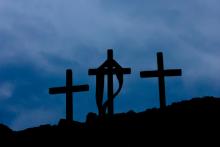The symbolic procession was only several meters long and a few potted olive trees were brought in.
palm sunday


OUR LECTIONARY REFLECTIONS for April encompass Palm Sunday and three weeks of readings for Easter. I found these scriptures deeply moving as they presented Jesus of Nazareth through different eyes and in different contexts.
One spring many years ago, our small Mennonite church near Chicago centered our worship services from Easter to Pentecost on stories of Jesus’ resurrection. It was my first experience of “Eastertide,” and I never forgot it. Each week we focused on a different resurrection account in the New Testament—one from each gospel (two from Luke) and 1 Corinthians 15. Comparing different perspectives, our services highlighted the many witnesses to a singular, unexpected event that can help convince us today that this crucified prophet has been resurrected and exalted as Messiah and Lord (see Philippians 2:9-11).
Two more thoughts: First, in the passages below we unfortunately miss the terrifying events after Palm Sunday, during which Jesus confronts the Powers—both high-priestly and Roman—that want to get rid of this “King of the Jews.” Jesus was crucified as a political threat. To accept the risen Jesus as Lord is to take on the (often political) struggle between good and evil in our current contexts.
Second, our faith is not just spiritual. Jesus’ bodily resurrection speaks of the value God places on physical bodies. Though Jesus was black-haired and brown-skinned, God loves all shades and shapes of bodies. Through Jesus’ resurrection, we catch a glimpse of the age to come. It may indeed be, as C.S. Lewis characterizes the new Narnia, deeper and more solid than our present age.
April 5
A Risky Donkey Ride
Isaiah 50:4-9; Psalm 118:1-2, 19-29; Philippians 2:5-11; Matthew 21:1-11
ABOUT 40 YEARS after the original “Palm Sunday” in Jerusalem, the Jewish historian Josephus wrote a history called The Wars of the Jews. In it, he described the welcome received by the Roman Emperor Vespasian when he returned to Rome after destroying Jerusalem and its temple.
The Romans were so fired up that many exited the city to meet him: “The whole multitude ... came into the road and waited for him there.” With great joy, “they styled him their Benefactor and Savior.”
In contrast, Jesus’ “triumphal entry” into Jerusalem parodies the ancient tradition of a victorious king welcomed home to his city after a battle. Rather than riding a white horse, the Middle Eastern Jesus borrows a donkey (Matthew 21:2). Although a large crowd of outsiders created a path for him with cloaks and branches, Jerusalem’s citizens have one startled response: “Who is this?” (verses 8, 10). But even his followers do not call him a king; he is “the prophet Jesus from Nazareth in Galilee” (verse 11).
Rather than a victorious welcome such as Vespasian received, Jesus knows he is raising the stakes in a land as sharply divided as our own. He must nonviolently challenge the corruption that lies at the core of its leadership—Caiaphas and other chief priests who negotiate with Rome for their own interests. Jesus of Nazareth knows his dramatic action will likely result in his execution, but to honor God, he must take the risk.
Only after these Jerusalem events can the “daughter of Zion” go back to her scriptures and find texts such as Zechariah 9:9 where “your king is coming to you, humble, and mounted on a donkey” (Matthew 21:5). Or the song of victory in Psalm 118: “Blessed is the one who comes in the name of the Lord ... bind the festal procession with branches!” (verses 26-27).
Later believers can sing a hymn to their Messiah Jesus (in Philippians 2:6-11), who had “humbled himself to the point of death” and then became exalted above every other human as Lord.

As a follower of Jesus, I am acutely aware of the painful paradox represented by the fact that thousands of self-proclaimed evangelical Christians supported, and continue to support, our nation’s current president. These same evangelical Christians have historically resisted attempts to pass any sort of commonsense gun control legislation (although the tide is shifting).

Isn’t that the question that the thousands gathered in Jerusalem for Passover, and the small circle of disciples and friends, were asking on that first Palm Sunday, and in the fateful week that followed? Who is this Jesus? And is it the Jesus we want to follow? The one we thought we were following? Or the one we now end up denying and rejecting? Which Jesus?

Our concerns about the future of our nation’s values, heart, and soul, and even for democracy itself compel us to respond more theologically than politically, where what we believe is the foundation of the things we must vocally reject. We believe that the future of the nation’s soul, and the integrity of faith, are both at stake.

In the desecrated churches of Qaraqosh, Christians are busy removing graffiti daubed by the Sunni Muslim militants during two and a half years of control — only for new slogans to have appeared, scrawled by Shi'ite members of the Iraqi forces fighting street to street with the jihadists in Mosul.

Some years ago, Carl Jung told the story of a man who asked a rabbi why God was revealed to many people in days of old, but now nobody sees God.
“Why is this?” he asked.
The rabbi answered, “Because nowadays no one bows low enough.”
Perhaps we are looking for God in all the wrong places. In this video, Sister Margaret goes to prison. She is not Jesus. She is not God. But she believes God is there in Riker’s Island, “home” to 1300 prisoners, half of them teenagers. She listens to their stories.
“My father walked out on us ... I messed up ... I had no one to back me up.”
Their stories changed her.
"I don’t know what it’s like not to be loved. I don’t know what it’s like to be abused, to be abandoned,” she says.
She is really saying, “I didn’t know before what it’s like to be so far down.”
These prisoners are teaching her even as she is counseling and encouraging them. Those men in Riker’s Island would probably be surprised to hear that Paul was a prisoner when he wrote this week’s lectionary selection, a letter to the Philippians.

We love a good parade, don’t we? All that celebration, the noise, the crowds, the jubilation … It’s exciting and contagious and a little amazing how a good parade can impact us.
No one understood this like the Romans. These are the people of bread and circuses after all, and no one in the ancient world did empire better than the Romans. The Romans were incredibly good at subduing those people they had conquered. They celebrated the festivals of, raised up leadership from, and generally ingratiated themselves smoothly into the lives of those they ruled. But rule they did.
There certainly were people in Jesus’ time who thought Jesus’ work would be to overthrow the Roman oppressors — establish a political kingdom. Scholars surmise that Judas, the disciple who would betray Jesus to the empire, was one of these. Think of Judas as someone who saw the evils of the Roman Empire and desperately wanted Hebrew rule returned to the region. What we might today call a freedom fighter.
But throughout his ministry, Jesus talked explicitly about the Kingdom of God, the Kingdom of Heaven that is not of this world but is omnipresent, always at hand, constantly among us. And God’s. Period. A very different image of kingship, of dominion.

Make no mistake: the Gospel is political.
Politics refers to “the affairs of the city” and “influencing other people on a civic or individual level.”
Throughout his life, death, and resurrection, Jesus is political. He influences people to live into the Kingdom of Heaven. For Jesus, Heaven is not essentially some place off in the distance where you go after you die. No, Heaven is a way of life to be lived right here, right now. We see this clearly in the prayer he taught his disciples:
Thy kingdom come, thy will be done on earth as it is in heaven.
When Jesus entered Jerusalem riding a donkey on Palm Sunday, he was performing a political act. But it was a political act unlike any other.

Have you ever noticed that society allows fans to do things that, short of fandom, we would deem absolutely crazy? When do grown adults have permission to paint their faces with logos except on the day of the big game? When is hugging perfect strangers acceptable? After a 3-point shot of your favorite team beats the buzzer, it’s expected. Screaming at the top of our lungs is perfectly acceptable when we’re in a crowd of thousands doing the same.
March Madness wraps up this week and a tournament champion will be crowned. Whatever the outcome of Monday’s championship game, we can guarantee that there will be screaming crowds at AT&T Stadium in Arlington, Texas. (The final may break the record of largest crowd ever to attend a NCAA basketball game with 75,421 attendees.)
Crowds change social norms. Whether they are for sport, political protest, or public worship, gathering with thousands inevitably changes our mood and actions. I have never felt as alone as in a rival team’s stadium filled with thousands of home-team fans. I rarely feel as important as when I’ve gathered with others to protest unjust laws or call for social action. I get Goose bumps when I’m able to recite the Lord’s Prayer with a few thousand other worshipers.
Next Sunday, April 13, 2014, is known as Palm Sunday. Around the world Christians will gather to wave palm branches.

We're anticipating.
We're jubilant!
“Hosanna in the highest! Blessed is he who comes in the name of the Lord!”
So, we dance and we sing.
But just before this moment in the story there's this surprising passage. The Gospel of Luke reads, "As they were listening to this, he went to tell a parable, because he was near Jerusalem, and because they assumed that the kingdom of God was to appear immediately."
"Immediately." Well, at least they knew their own minds. This is the trouble about knowing our own minds. It's not the same thing as having a thesis with a well constructed argument. And it's not the same thing as being right.

On Palm Sunday many will hear the Gospel of Luke’s perspective surrounding Jesus’ celebrated entry into Jerusalem (Luke 19:28-40). In hearing this well-known portion of the New Testament, we are often led to wonder how the same crowds that so graciously and enthusiastically welcomed Jesus would passionately and viciously call for his death just a few days later. In trying to comprehend the sudden and significant shift in public opinion, we recognize that the crowds did not swing their support independently, but rather, they were acting under the influential push of propaganda.
As Luke’s Gospel reminds us, in between Jesus’ entry into Jerusalem and the calls for his crucifixion, the “chief priests and the scribes” plotted to put Jesus to death (22:2). As these powerful elites were “afraid of the people”, they conspired in a power-protecting push to have Jesus humiliated, tortured, and brutally killed. And so, while Luke’s Gospel does not provide exact details into the strategies of the chief priests and scribes, their motivations appear to be clear, as they, and others within the ruling class, perceived Jesus as a risk and thus needed to ensure his quick and clear elimination. As a result, due to the influential influx of propaganda, combined with an overly complicit public, just a short time after Jesus was welcomed as a king he was sentenced to death as a criminal.

The Bible is steeped in drama. Consider Jesus’ bold reading of Isaiah in the synagogue (Lk. 4:18-19), or Solomon’s liturgy climaxing in the LORD’s glory filling the temple (1 Ki. 8). Paul may have directed a performance of Jesus’ death: “It was before your eyes that Jesus Christ was publicly exhibited as crucified!” (Gal. 3:1c). Dramatic structure serves to sharpen our focus and draws us into narrative as imagined and experienced co-conspirators.
Several sources have recommended this commentary by M.J. Rosenberg at Media Matters as a helpful analysis of the new "Obama Peace Plan" for the Middle East.